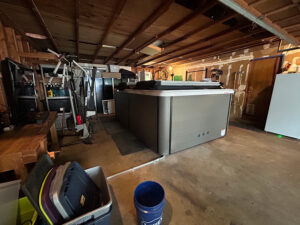Electrical issues are one of the most common problems homeowners face, and they often share a few root causes. Outdated wiring, overloaded circuits, faulty installations, troublesome appliances and weather-related wear and tear are frequent culprits. These problems can manifest in many ways, from buzzing outlets to complete power outages, and it’s essential to address them promptly to avoid larger hazards like fires or electric shock.
Below, we’ve outlined some of the most common electrical problems and linked to more detailed articles that dive into each issue. Whether you’re troubleshooting buzzing outlets or dealing with power surges, this guide will point you in the right direction.
Keep in mind that these issues are best handled by a licensed electrician, so get in touch with us if you’d like to skip the troubleshooting and get our residential electricians on site to help you out.
Exterior Outlets Not Working
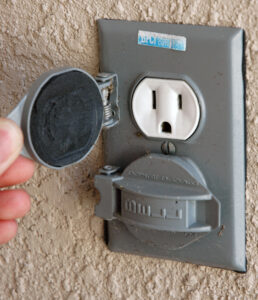
If your exterior outlets have stopped working, it could be due to tripped breakers, faulty GFCIs (Ground Fault Circuit Interrupters), or even weather damage. Exterior outlets are exposed to the elements and even wildlife, making them more prone to issues that require immediate attention to avoid potential hazards like electrocution.
Learn more about troubleshooting exterior outlet issues
Dimmer Switch Buzzing
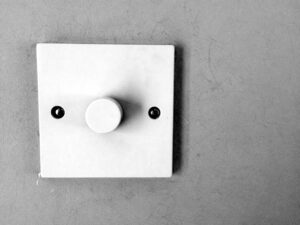
A buzzing dimmer switch can be more than just annoying—it might signal an underlying electrical problem. Common causes include faulty wiring, incompatible lightbulbs, or even a defective switch. While dimmer switches are supposed to run quietly, buzzing sounds often point to something that needs fixing.
How to troubleshoot a buzzing dimmer switch
Electrical Outlet Buzzing
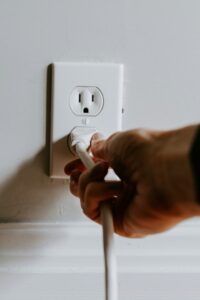
A buzzing sound from an outlet is never a good sign. This issue can be caused by loose wiring, an overloaded circuit, or internal damage to the outlet. Addressing this quickly is essential, as it may prevent more serious issues like electrical fires.
Buzzing outlets and how to fix them
Power Out in One Room of the House

When the power goes out in just one room, it’s often the result of a tripped breaker, a blown fuse, or a loose wire within the circuit. Isolating the problem can be tricky, but it’s a good idea to start with the breaker box and reset any tripped switches.
Troubleshooting power outages in one room
Power Out in the Whole House

A full-house power outage can be the result of more serious issues, such as a grid failure, faulty wiring, or a defective main circuit breaker. While it might feel overwhelming, diagnosing and addressing the problem promptly will help restore power efficiently.
Diagnosing a whole-house power outage
Power Surges

Power surges can be caused by several factors, including lightning strikes, faulty appliances, or issues with the power grid. These surges can damage electronics and appliances in your home, so it’s crucial to prevent them with surge protectors or dedicated circuits.
Discover what causes power surges and how to prevent them
Short Circuits

A short circuit occurs when an electrical current strays from its intended path, often due to faulty wiring, appliance issues, or damaged cords. Short circuits are a major fire hazard, so if you suspect one in your home, it’s important to take immediate action.
The causes and effects of short circuits
Defective Circuit Breaker
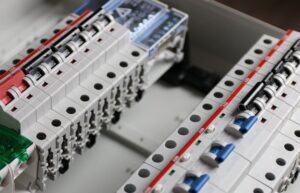
A defective circuit breaker can lead to repeated power interruptions, flickering lights, or even fires. Breakers are designed to protect your home’s electrical system, so if they start malfunctioning, it’s important to replace them as soon as possible.
The signs of a defective circuit breaker
Discover when should you replace your electrical panel
Lights Flicker When Dryer Starts

If your lights flicker when you turn on heavy-duty appliances like a dryer, it may be a sign of an overloaded circuit or inadequate electrical capacity in your home. This could signal that your home needs an electrical upgrade to accommodate modern appliances.
Read more about why your lights flicker when the dryer starts
Problems Created During Electrical Installation
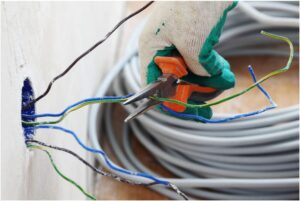
Unfortunately, not all electrical installations are done correctly, and faulty installations can lead to a host of issues down the road. Whether it’s loose wires, poor connections, or code violations, improper installations should be corrected by a licensed electrician.
Learn about common electrical installation problems here.
Here’s our solutions to common electrical issues during remodeling.
Ready to get your electrical issues under control? Give Prairie Electric a call at 800-573-2750 or fill out the service request form and we’ll get back to you as soon as possible during business hours.


